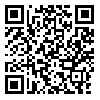Volume 31, Issue 1 (Winter 2023)
Avicenna J Nurs Midwifery Care 2023, 31(1): 65-74 |
Back to browse issues page
Ethics code: IR.AJUMS.REC.1401.110
Download citation:
BibTeX | RIS | EndNote | Medlars | ProCite | Reference Manager | RefWorks
Send citation to:



BibTeX | RIS | EndNote | Medlars | ProCite | Reference Manager | RefWorks
Send citation to:
Vahedi S, Moradi S, Amraei M, Atarzade S, Kianpour S, Zare Nasiri M. Assessment of the Barriers to Medical Error Reporting the Viewpoint of Nurses in Selected Hospitals of Ahvaz. Avicenna J Nurs Midwifery Care 2023; 31 (1) :65-74
URL: http://nmj.umsha.ac.ir/article-1-2485-en.html
URL: http://nmj.umsha.ac.ir/article-1-2485-en.html
Sajad Vahedi1 

 , Samaneh Moradi2
, Samaneh Moradi2 

 , Mahdi Amraei2
, Mahdi Amraei2 

 , Shahrzad Atarzade3
, Shahrzad Atarzade3 

 , Shirin Kianpour4
, Shirin Kianpour4 

 , Mohsen Zare Nasiri *
, Mohsen Zare Nasiri * 

 5
5


 , Samaneh Moradi2
, Samaneh Moradi2 

 , Mahdi Amraei2
, Mahdi Amraei2 

 , Shahrzad Atarzade3
, Shahrzad Atarzade3 

 , Shirin Kianpour4
, Shirin Kianpour4 

 , Mohsen Zare Nasiri *
, Mohsen Zare Nasiri * 

 5
5
1- Department of Health Services Management, School of Health, Ahvaz Jundishapur University of Medical Sciences, Ahvaz, Iran
2- School of Health, Student Research Committee, Ahvaz Jundishapur University of Medical Sciences, Ahvaz, Iran
3- Clinical Research Development Unit, Golestan Hospital, Ahvaz Jundishapur University of Medical Sciences, Ahvaz, Iran
4- Treatment Deputy, Ahvaz Jundishapur University of Medical Sciences, Ahvaz, Iran
5- School of Health, Student Research Committee, Ahvaz Jundishapur University of Medical Sciences, Ahvaz, Iran , mzarenasiri@gmail.com
2- School of Health, Student Research Committee, Ahvaz Jundishapur University of Medical Sciences, Ahvaz, Iran
3- Clinical Research Development Unit, Golestan Hospital, Ahvaz Jundishapur University of Medical Sciences, Ahvaz, Iran
4- Treatment Deputy, Ahvaz Jundishapur University of Medical Sciences, Ahvaz, Iran
5- School of Health, Student Research Committee, Ahvaz Jundishapur University of Medical Sciences, Ahvaz, Iran , mzarenasiri@gmail.com
Abstract: (1402 Views)
Background and Objective: Error reporting leads to changes in hospital processes and improved health outcomes. In this regard, this study aimed to examine the barriers to the reporting of medical errors from the viewpoint of nurses in selected hospitals in Ahvaz, Iran.
Materials and Methods: The statistical population of this descriptive analysis research included all the nurses working at Golestan Educational and Medical Hospital, Amir AL-Mominin Hospital, and Aria Hospital, Ahvaz, Iran. The total sample size was calculated at 256 participants with the help of the Morgan table. The required data were collected using Anderson's questionnaire on barriers to reporting medical errors. Quantitative data analysis was performed in SPSS software (version 23).
Results: The results showed that legal factors (2.14±0.476) are the most important reason for not reporting medical errors. Fear of reprimand (85.9%), high workload (92.5%), exposure to accusations (93.8%), and the possibility of added workload (87.4%) were the most important legal, cultural and organizational, supervision regulation, and financial factors, respectively. Moreover, the results showed that the nurses of Golestan and Amir AL-Mominin Public Hospital and Aria Private Hospital stated legal and financial factors as the most important reason for not reporting medical errors, respectively. Besides, the findings revealed that there are significant relationships between the factors of reporting medical errors and the variables of age, work experience, and the amount of overtime.
Conclusion: Effective communication, sufficient support of managers for nurses, the existence of an efficient error reporting system, and effective use of the obtained reports are effective in increasing medical error reporting.
Materials and Methods: The statistical population of this descriptive analysis research included all the nurses working at Golestan Educational and Medical Hospital, Amir AL-Mominin Hospital, and Aria Hospital, Ahvaz, Iran. The total sample size was calculated at 256 participants with the help of the Morgan table. The required data were collected using Anderson's questionnaire on barriers to reporting medical errors. Quantitative data analysis was performed in SPSS software (version 23).
Results: The results showed that legal factors (2.14±0.476) are the most important reason for not reporting medical errors. Fear of reprimand (85.9%), high workload (92.5%), exposure to accusations (93.8%), and the possibility of added workload (87.4%) were the most important legal, cultural and organizational, supervision regulation, and financial factors, respectively. Moreover, the results showed that the nurses of Golestan and Amir AL-Mominin Public Hospital and Aria Private Hospital stated legal and financial factors as the most important reason for not reporting medical errors, respectively. Besides, the findings revealed that there are significant relationships between the factors of reporting medical errors and the variables of age, work experience, and the amount of overtime.
Conclusion: Effective communication, sufficient support of managers for nurses, the existence of an efficient error reporting system, and effective use of the obtained reports are effective in increasing medical error reporting.
Type of Study: Original Research |
Subject:
Nursing
Received: 2022/09/14 | Accepted: 2023/01/15 | Published: 2023/03/1
Received: 2022/09/14 | Accepted: 2023/01/15 | Published: 2023/03/1
Send email to the article author
| Rights and permissions | |
 |
This work is licensed under a Creative Commons Attribution-NonCommercial 4.0 International License. |




 gmail.com
gmail.com